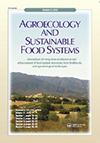Peasant Innovations and the Search for Sustainability: The Case of Carnaubais Territory in Piauí State, Brazil
引用次数: 12
Abstract
This article pursues two aims. The first is to assess the degree of sustainability in peasant agroecosystems through the application of the systemic approach, allowing an integrated understanding of technical, environmental, economic, and social impacts to support the agroecological transition process; the second is to comprehend the basis farmers have and the strategies they use in locally favoring the emergence of the innovations that constitute the object of analysis. The conceptual framework used ia that of the MESMIS method, which is based on a set of system attributes for agroecosystem assessment. Results indicate that innovations made by family farmers favored improvements in essential elements of system sustainability, making possible sustainable land use, assuring an increase in income, and maintenance of family employment and farm structuring. These factors cast light on the relevance of local knowledge as a key factor in policies that promote the sustainability of family systems, and as a basis for an agroecological transition process.农民创新与可持续发展:以巴西Piauí州Carnaubais地区为例
这篇文章有两个目的。首先是通过应用系统方法评估农民农业生态系统的可持续性程度,从而综合了解技术、环境、经济和社会影响,以支持农业生态转型进程;第二是了解农民所拥有的基础和他们在当地使用的策略,这些策略有利于构成分析对象的创新的出现。使用的概念框架是MESMIS方法的概念框架,该方法基于一组用于农业生态系统评估的系统属性。结果表明,家庭农民的创新有利于改善系统可持续性的基本要素,使土地可持续利用成为可能,确保收入增加,并维持家庭就业和农场结构。这些因素表明,地方知识是促进家庭制度可持续性政策的关键因素,也是农业生态过渡过程的基础。
本文章由计算机程序翻译,如有差异,请以英文原文为准。
求助全文
约1分钟内获得全文
求助全文

 求助内容:
求助内容: 应助结果提醒方式:
应助结果提醒方式:


